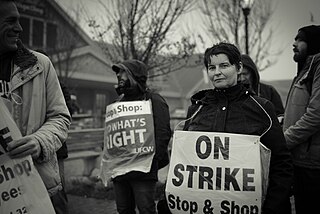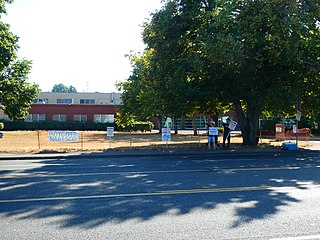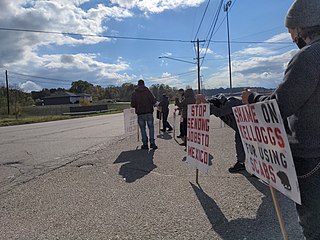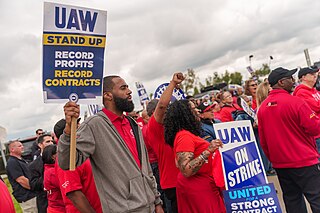Related Research Articles

Strike action, also called labor strike, labour strike in British English, or simply strike, is a work stoppage caused by the mass refusal of employees to work. A strike usually takes place in response to employee grievances. Strikes became common during the Industrial Revolution, when mass labor became important in factories and mines. As striking became a more common practice, governments were often pushed to act. When government intervention occurred, it was rarely neutral or amicable. Early strikes were often deemed unlawful conspiracies or anti-competitive cartel action and many were subject to massive legal repression by state police, federal military power, and federal courts. Many Western nations legalized striking under certain conditions in the late 19th and early 20th centuries.

The Great Railroad Strike of 1922, or the Railway Shopmen's Strike, was a nationwide strike of railroad workers in the United States. Launched on July 1, 1922 by seven of the sixteen extant railroad labor organizations, the strike continued into August before collapsing. A sweeping judicial injunction by Judge James Herbert Wilkerson effectively ended the strike on September 1, 1922.
The 1983 Arizona copper mine strike began as a labour dispute between the Phelps Dodge Corporation and a group of union copper miners and mill workers, led by the United Steelworkers. The subsequent strike lasted nearly three years and resulted in the replacement of most of the striking workers and decertification of the unions. It is regarded as an important event in the history of the United States labor movement.
The Bituminous coal strike of 1977–1978 was a 110-day national coal strike in the United States led by the United Mine Workers of America. It began December 6, 1977, and ended on March 19, 1978. It is generally considered a successful union strike, although the contract was not beneficial to union members.
The Culinary Workers Union, UNITE HERE Local 226 is a local union affiliated with UNITE HERE which operates in the Las Vegas metropolitan area of Nevada. Members include a variety of occupations organized along craft lines working in restaurants, hotels and laundries, in the casinos in the Las Vegas metropolitan area and Reno, as well as Harry Reid International Airport and Valley Hospital Medical Center. While most Culinary members work in casinos, the union does not represent dealers and other employees directly providing gaming services. The union also has a partnership with the Culinary Academy of Las Vegas, which Hattie Canty, the first African-American woman elected to be president of the Culinary Union, was instrumental in organizing. Local 165 of UNITE HERE represents bartenders in Las Vegas although the two locals negotiate contracts in tandem.
The 1927 Indiana bituminous strike was a strike by members of the United Mine Workers of America (UMWA) against local bituminous coal companies. Although the struggle raged throughout most of the nation's coal fields, its most serious impact was in western Pennsylvania, including Indiana County. The strike began on April 1, 1927, when almost 200,000 coal miners struck the coal mining companies operating in the Central Competitive Field, after the two sides could not reach an agreement on pay rates. The UMWA was attempting to retain pay raises gained in the contracts it had negotiated in 1922 and 1924, while management, stating that it was under economic pressure from competition with the West Virginia coal mines, was seeking wage reductions. The strike proved to be a disaster for the union, as by 1929, there were only 84,000 paying members of the union, down from 400,000 which belonged to the union in 1920.
The 1935Pacific Northwest lumber strike was an industry-wide labor strike organized by the Northwest Council of Sawmill and Timber Workers Union (STWU). The strike lasted for more than three and a half months and paralyzed much of the lumber industry in Northern California, Oregon and Washington state. Although the striking workers only achieved part of their demands, the repercussions of the long and often violent strike were felt for decades. Over the next several years, a newly radicalized and militant generation of lumber workers would go on to spark several more industry-wide strikes.
The Empire Zinc strike, also known as the Salt of the Earth strike, was a 15-month-long miners' strike in Grant County, New Mexico against the Empire Zinc Company for its discriminatory pay. The strike drew national attention, and after it was settled in 1952, a movie entitled Salt of the Earth (1954) was released that offered a fictionalized version of events.

The 2019 Stop & Shop strike began on April 11, 2019, when approximately 31,000 workers, represented by United Food and Commercial Workers, walked off the job and began picketing Stop & Shop locations across New England, in the U.S. states of Massachusetts, Rhode Island, and Connecticut. The strike was in response to the company not agreeing after extensive negotiations to a contract which did not reduce employee pay and benefits. The strike ended ten days later on April 21.
The 2019 AT&T strike was a labor strike involving about 20,000 employees of AT&T in the Southern United States. Members of the Communications Workers of America (CWA) went on strike from August 24 to August 28, following the failure to agree to new employment contracts. Following several days of protest across nine states, the strike ended with a tentative deal reached between CWA and AT&T.
The 2020 University of Illinois Hospital strikes were the result of a breakdown in contract negotiations between labor unions and hospital management over salaries, staffing levels, and access to personal protective equipment.

The 2021–2023 Warrior Met Coal strike was a labor strike in Alabama, United States. The strike began on April 1, 2021 and involved members of the United Mine Workers of America striking against Warrior Met Coal Inc. Warrior Met was formed after the bankruptcy of Walter Energy and operates coal mining facilities in the state. The strike was over the failure of the union and company to agree to a labor contract for the approximately 1,100 union members who work for Warrior Met.

The 2021 Nabisco strike was a labor strike involving workers for the American snack manufacturer Nabisco, a subsidiary of Mondelez International. The strike began at a Nabisco facility in Portland, Oregon on August 10 and over the next few days spread to several more Nabisco facilities throughout the United States.
The 2021 Virginia Volvo Trucks strike was a labor strike involving workers at a Volvo Trucks production facility in Dublin, Virginia, United States. The strike began in April and ended in July with the ratification of a new labor contract.

The 2021 Kellogg's strike was a labor strike started on October 5, 2021, and ended December 21, 2021, involving about 1,400 workers for food manufacturer Kellogg's, unionized as members of the Bakery, Confectionery, Tobacco Workers and Grain Millers' International Union (BCTGM). The strike was caused due to disagreements between the union and company concerning the terms of a new labor contract, with particular points of contention concerning the current two-tier wage system, health care, holidays, retirement benefits, cost-of-living adjustments, and vacation time. The strike affected all of Kellogg's cereal-producing plants in the United States, consisting of plants in Battle Creek, Michigan; Omaha, Nebraska; Lancaster, Pennsylvania; and Memphis, Tennessee. It is one of several strikes conducted by the BCTGM in 2021, including strike action against Frito-Lay and Nabisco.

The 2021 John Deere strike was a labor strike in the United States that began on October 14 and ended on November 17, and involved about 10,000 employees for John Deere, a manufacturer of agricultural and heavy machinery. These employees are members of the United Auto Workers (UAW) labor union, which had been negotiating a new contract with John Deere for several months. On November 17, the workers approved a new 6-year contract officially putting an end to the strike. The strike was John Deere's first in over three decades.
The 2021 Heaven Hill strike was a labor strike involving about 420 workers for the Heaven Hill bourbon whiskey distillery in Bardstown, Kentucky, United States. These workers are members of the United Food and Commercial Workers Local 23D and were on strike since September 11. The labor dispute is over the terms of a new five-year labor contract between the union and the company, which is one of the largest bourbon producers in the world. In particular, union members were concerned about "gray areas" in the contract that they believed could lead to union employees working weekends and extra overtime without pay. Additional concerns from the union were over reduced take-home pay and a removal of the limit on premiums for health care insurance. On September 9, union members voted by about 96 percent to reject the proposed contract and authorized strike action. As a result, the union's existing contract expired without replacement on September 10 and striking commenced the following day.
The 1985–1987 Watsonville Cannery strike was a labor strike that involved over 1,000 workers at two food processing facilities in Watsonville, California, United States. The facilities were owned by Watsonville Canning and Richard A. Shaw Inc., two of the largest frozen food processors in the United States, while the workers were all union members of the International Brotherhood of Teamsters (IBT) Local 912. The strike began on September 9, 1985, and completely ended about 18 months later, on March 11, 1987.
The 2022–2023 HarperCollins strike was a labor strike involving about 250 workers for HarperCollins, an American publishing company headquartered in the New York City borough of Manhattan. The workers, members of the United Auto Workers (UAW) Local 2110, went on strike on November 10, 2022, after failing to reach an agreement with the company regarding a new labor contract. The union members returned to work on February 21, 2023, after agreeing to a new contract that addressed many of the concerns they had initially had, including an increase in starting salaries and changes to some work regulations.

The 2023 United Auto Workers strike was a labor strike involving automobile workers in the labor union United Auto Workers (UAW) and the three unionized automakers in the United States—Ford Motor Company, General Motors, and Stellantis. These three automakers' factories combined employ about 145,000 UAW members and produce about 50 percent of the vehicles manufactured annually in the US, accounting for 1.5 percent of US GDP. The strike began on September 15, 2023, when the union was unable to reach a deal with the three automakers. It was the first trilateral strike against the three automakers in the union's history.
References
- ↑ David Goldman and Aaron Smith (13 April 2016). "36,000 Verizon workers go on strike". CNNMoney.
- ↑ Paul R. La Monica (25 May 2016). "Verizon strike is hurting its stock". CNNMoney. Retrieved 26 May 2016.
- ↑ Ryan Knutson (24 May 2016). "Verizon CEO: Strike May Hit Results". WSJ. Retrieved 26 May 2016.
- ↑ "Verizon Strike". HuffPost . Retrieved 26 May 2016.
- ↑ "45,000 Verizon Workers Go On Strike Over Contract". Fox News. Retrieved 26 May 2016.
- ↑ Dayen, David. "The Verizon Strike Signals a Larger Economic Battle". The New Republic. The New Republic. Retrieved 26 May 2016.
- ↑ "Verizon and unions reach tentative deal to end strike". Reuters. 2016-05-27. Retrieved 2016-05-27.
- ↑ "Verizon Strike A Fight For Future of Labor". NBC News.
- ↑ "Verizon Strike 2016: What Are The Issues Dividing Company..." Montclair, NJ Patch. 24 May 2016.
- ↑ Knutson, Ryan. "Verizon CEO: Strike May Hit Results". The Wall Street Journal. Retrieved 26 May 2016.
- ↑ "Verizon strike heads for court showdown Thursday". USA TODAY. 25 May 2016. Retrieved 26 May 2016.
- ↑ "Bernie Sanders rallies with striking Verizon workers". MSNBC. 18 April 2016.
- ↑ "Bernie Sanders Joins Verizon Workers On Picket Line". The Huffington Post.
- ↑ "Clinton gave paid speeches to firms that lobbied, contracted with government". Fox News.